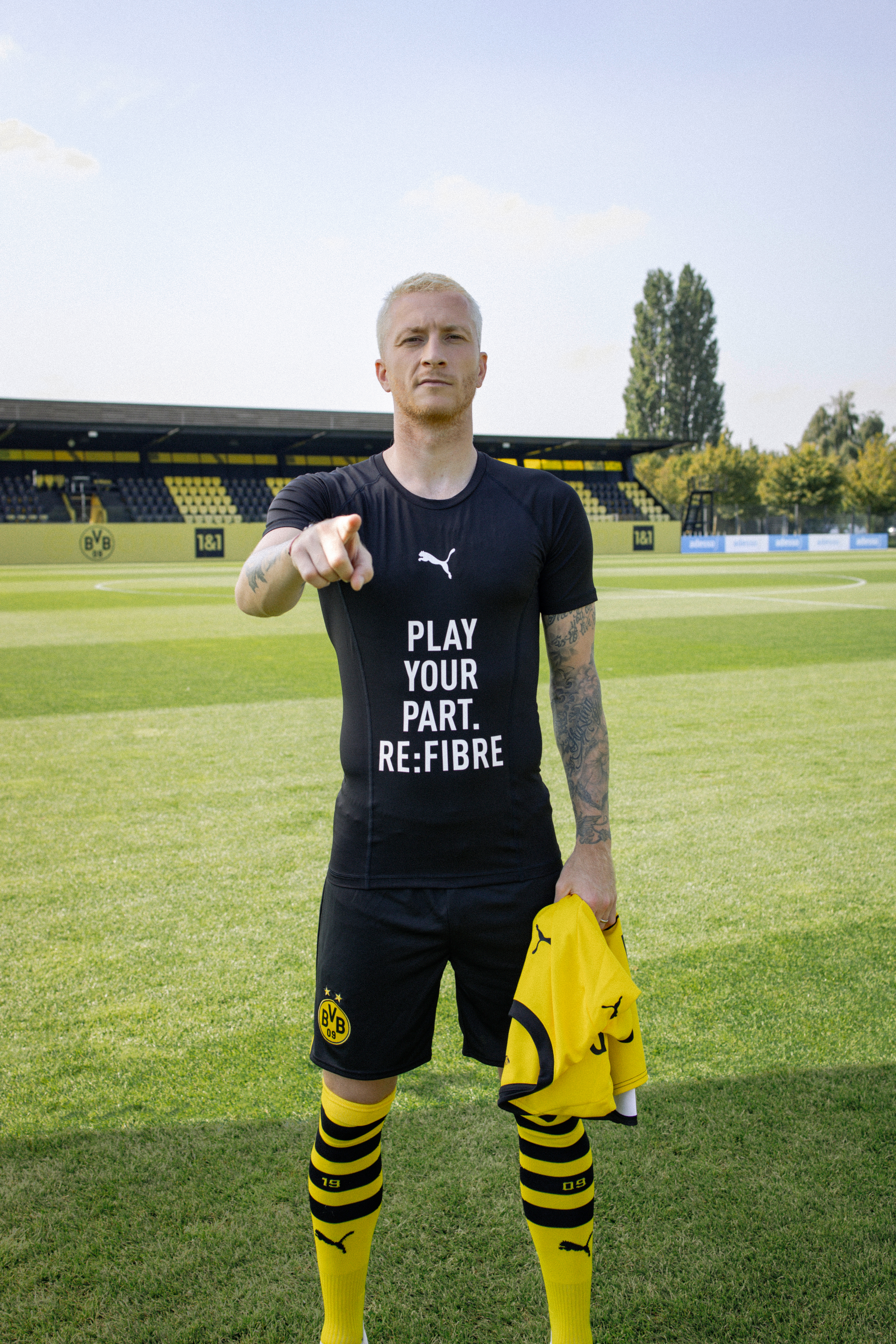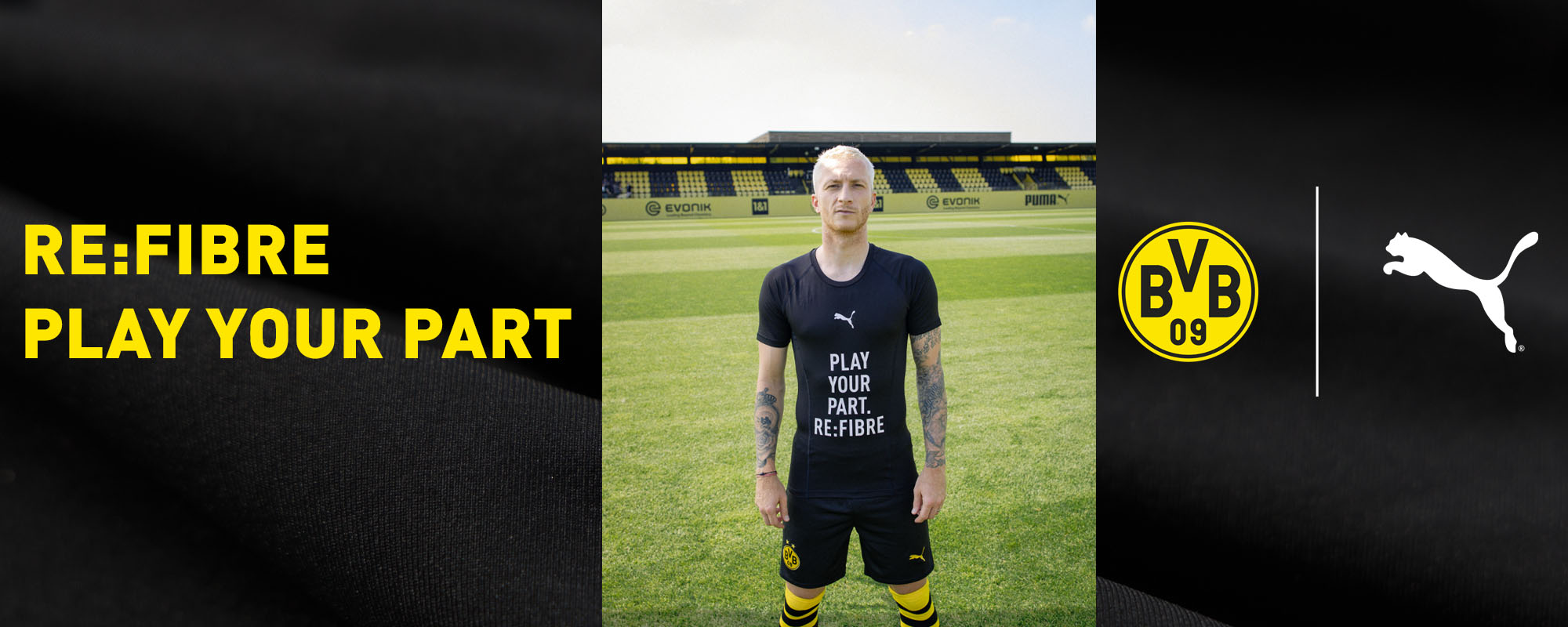
THE PROCESS
HOW DOES RE:JERSEY WORK?






THE RECYCLING PROCESS
DER RE:FIBRE RECYCLINGPROZESS
In the recycling process used for the RE:JERSEY project, even old garments that feature logos, embroideries and club badges can be used, as the material is chemically broken down into its main components (depolymerization). Colours are then filtered out and the material is chemically put back together to create a yarn (repolymerization) that has the same performance characteristics as virgin polyester. While PUMA’s football kits on the market today are already made from 100% recycled polyester, the RE:JERSEY kits worn during Saturday’s warm-up are made with 75% repurposed football jerseys. The remaining 25% comes from SEAQUAL ® MARINE PLASTIC.

DIE REGELN
Wir akzeptieren alle Modemarken Bitte nur frisch gewaschene Kleidung einwerfen. Es tut uns leid, aber wir akzeptieren keine Unterwäsche, Socken und Badebekleidung. Wir akzeptieren allerdings beschädigte Kleidung.
FAQ
QUESTIONS?
What makes the RE:JERSEY different from any other PUMA Jersey?
The main difference is that most of the raw material used for the RE:JERSEY is recycled from existing polyester garments, allowing for garment-to-garment recycling. This technology is a big step towards closing the material loop on polyester.
Is the RE:JERSEY fully made with garment-to-garment recycled materials?
The RE:JERSEY kits worn during Saturday’s warm-up are made with 75% repurposed football jerseys. The remaining 25% comes from SEAQUAL ® MARINE PLASTIC .
How does the recycling process differ from the recycled polyester used in other PUMA Jerseys?
PUMA’s football kits on the market today are already made from 100% recycled polyester. The company has set an ambitious target of 75% recycled polyester until 2025 for the entire apparel and accessories ranges.
Typically, PUMA ́s recycled polyester products are made from recycled plastic bottles. Plastic bottles can be mechanically recycled into new polyester. While not circular in the classical sense, this type of recycling helps reduce the littering of plastic bottles. In addition, mechanically recycled polyester has a considerably lower carbon footprint compared to conventional polyester.
In the recycling process used for the RE:JERSEY project, the garments are chemically broken down into their main components (depolymerization). Colors are then filtered out, and the material is chemically put back together to create a yarn (repolymerization) that has the same performance characteristics as virgin polyester.
How does the recycling process differ from other chemically recycled polyesters?
The innovative process used for our RE:JERSEY can deal with contaminations such as prints or emblems. Furthermore, the process is run in Europe, close to the home of PUMA ́s football teams.
What are PUMA ́s targets on recycled polyester?
PUMA plans to increase the content of recycled polyester in Apparel and Accessories from 17% in 2020 to 75% in 2025.
In addition, PUMA plans to increase the percentage of chemically recycled polyester over time to enhance garment-to-garment recycling and reduce our dependency on recycled plastic bottles.
What will be the learnings from the RE:JERSEY project?
The RE:JERSEY project will allow us to collect valuable experiences on garment-to-garment recycling. If successful, PUMA aims to replicate the process at a larger scale including their retail channels, and potentially wholesale partners.
How does the chemically recycled polyester impact the greenhouse gas emissions from the production of the jersey?
The fact that oil as a fossil feedstock is replaced by existing garments is the main benefit of chemically recycled polyester, which can be recycled again and again without a loss of quality. Chemically recycled polyester also generates reduced CO2 emissions compared to virgin polyester.
What is PUMA´s position on recycling plastic bottles?
Typically, PUMA´s recycled polyester products are made from recycled plastic bottles. Plastic bottles can be mechanically recycled into new polyester. While not circular in the classical sense, this type of recycling helps reduce the littering of plastic bottles. In addition, mechanically recycled polyester has a lower carbon footprint compared to conventional polyester.
Is this program only valid for PUMA products?
No. Products from any brand can be handed in as long as they`re made of 100% polyester. We do not accept underwear, socks (for hygiene reasons), footwear, swimwear and accessories.
What if the garment is dirty?
We ask you to hand in only dry and clean garments.
What if the garment is torn?
This is no problem. While this garment cannot be worn anymore by other people, the raw material can still be recycled.
Where is the take-back program active?
Planned collection points during the pilot program are the main Club stores of Manchester City, AC Milan, BVB, Olympique Marseille, Girona, and the PUMA retail store in Herzogenaurach.
© 1996 - 2023 Borussia Dortmund GmbH & Co. KGaA
